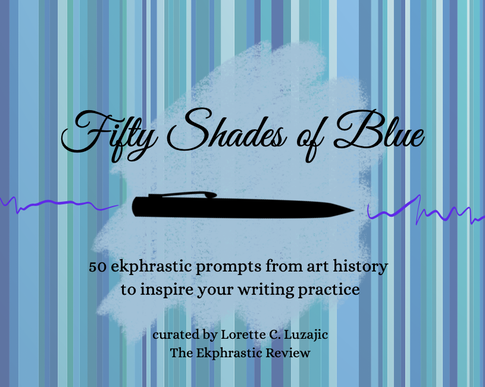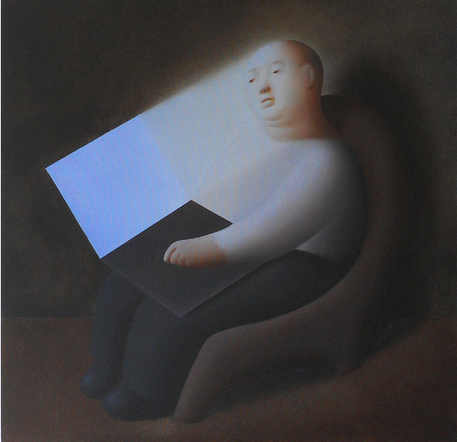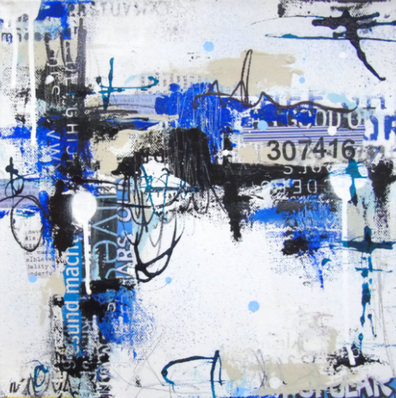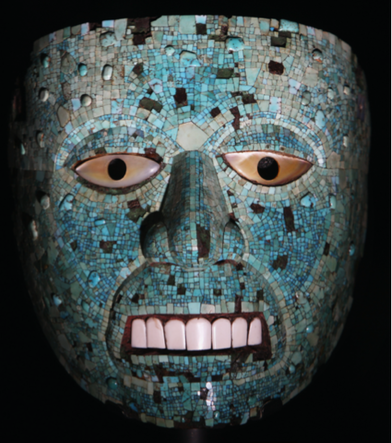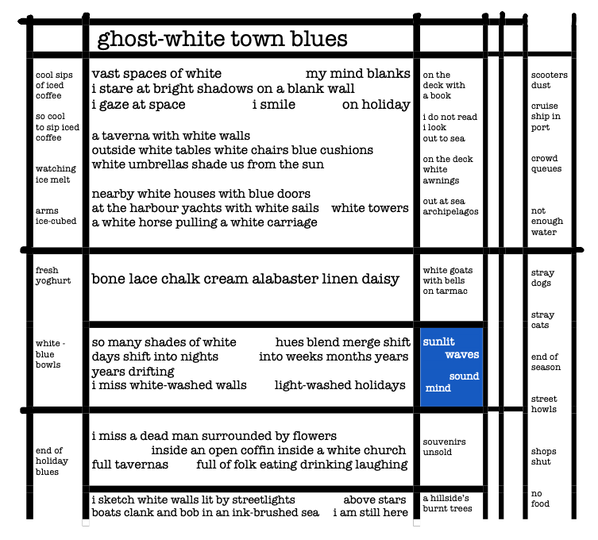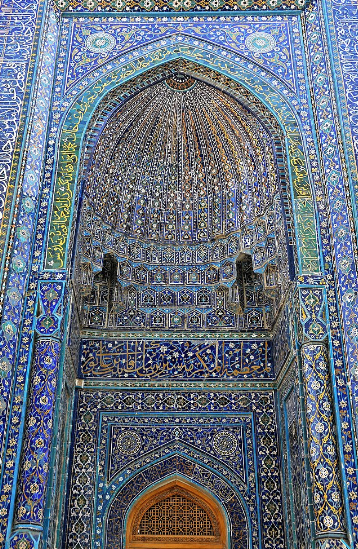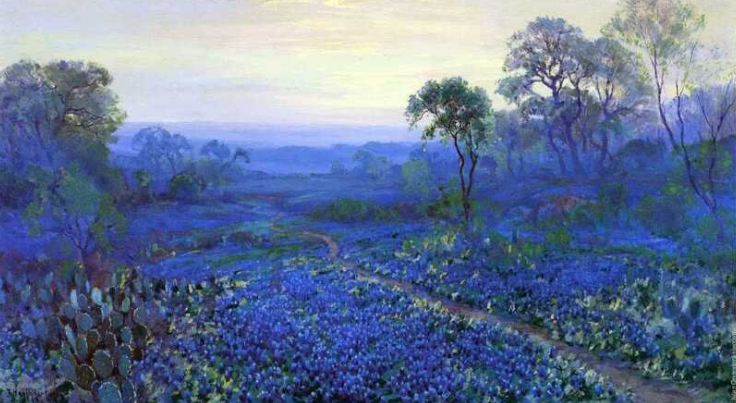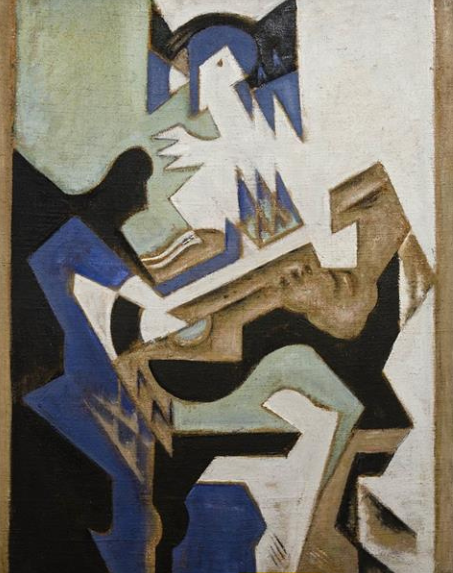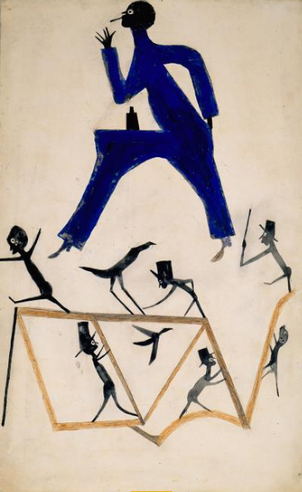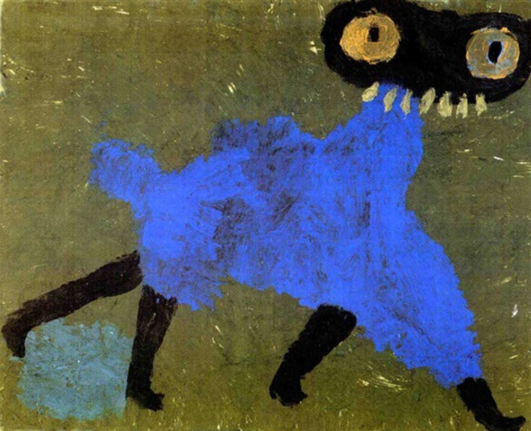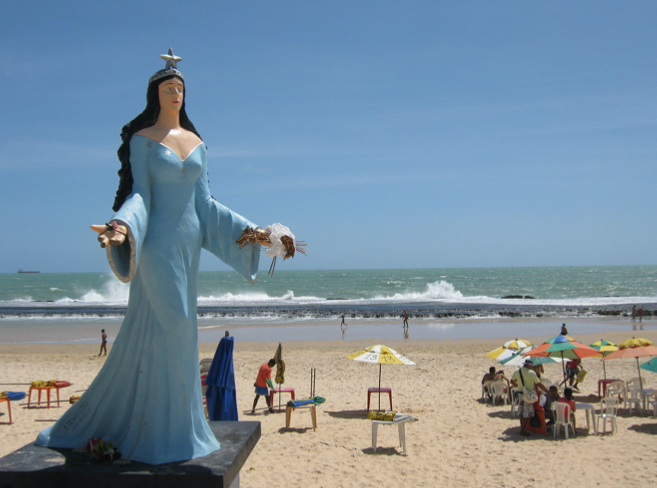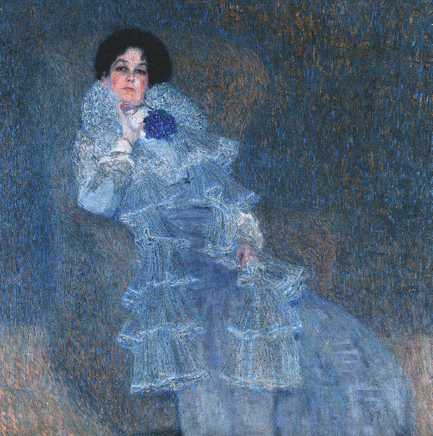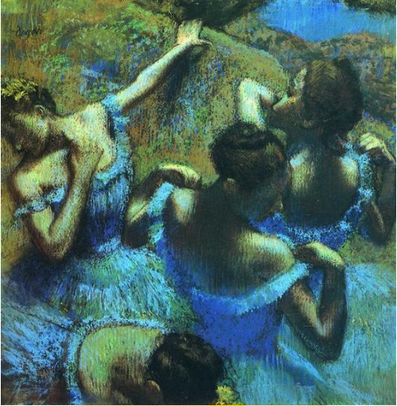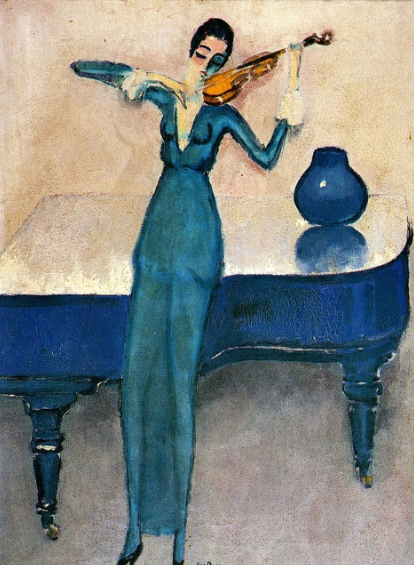|
The Fifty Shades of Blue ekphrastic flash fiction and poetry contest has come to a close. Today we are absolutely delighted to announce our finalists and share them with you. Please take a moment to share this page on your Facebook or Twitter- we want our writers to be read, and you can help with this simple social media click! Thank you to every single one of you who entered the contest. It was a rich experience to read through all of your stories and poems, and see how you were inspired by the imagery you were shown. As always, it was tough to choose finalists from so many wonderful perspectives and talents. Please join us in congratulating the finalists. The first place winner in each category will be announced soon and awarded their $100 prizes. Flash Fiction Finalists The Message, by Lynn Aprill Great-Great-Grandpa’s Teeth, by Finnian Burnett Façade of the Shirin-Bika Aga Mausoleum, by Kim Malcolm Young Man in the Moon, by Lisa Molina Disharmony, by Ronni Sandroff A Net of Blue Dancers, by Melinda Thomsen Poetry Finalists Built Blue, a Ghazal, by Laurel Benjamin ghost-white town blues, by Dorothy Burrows On Seeing Piet Mondrian’s Composition with Blue, by Ronnie Hess The Blue Coat, by Lynne Kemen Life Mosaic, by Jackie Langetieg Something Blue for My Daughter-in-Law: a Blessing, by Ellen Sazzman The Accountant Sets Aside Her Ledgers, by Alarie Tennille Wide/Blue/Cricket, by t.m. Thompson Iemanjá, Farol Desusado, by Bernardo Villela Young Man in the Moon The boy sits in the darkness, as the cold blue light shines from the screen of his laptop onto his now-bald head, and face with no brows or lashes. Massive amounts of medications he takes to kill the cancer cells in his blood also destroy the cells that protect him from illness. He can’t go to school, hang out with his friends, eat in a restaurant, see movies in theatres, or even leave his house, except to go to the hospital. He could, he is told, die from a common cold. So he sits, his laptop now his best friend, while the poison of life called ‘chemo’ kills his blood full of cancer, and the blue light reflects artificial light from his puffy swollen face back to the lifeless screen. They call it “Moon-face.” In the blue light of the darkness, he waits for the dawn of the warm and real light of the sun to shine upon him once again. For now, he is the Young Man in the Moon. Lisa Molina Lisa Molina is a writer/educator in Austin, Texas. Her chapbook, Don't Fall in Love with Sisyphus, published by Fahmidan Publishing & Co., will launch on 20 February, 2022. She has another chapbook forthcoming in March of 2023. Molina's words can be found in numerous publications, including The Ekphrastic Review, Beyond Words Magazine, Sparked Literary Magazine, Neologism Poetry Journal, and Bright Flash Literary Journal. Molina enjoys writing, singing, playing the piano, and spending time with her family. She now works with high school students with special needs, and loves teaching them the joys of reading and writing. Life Mosaic I Seasons are rectangular, winter white, spring blue summer richly black, and autumn counting down 307416; I see my life in this square—childhood loving the snow for angels, sled rides, ice caves, and sliding on ice skates, spring—blue all anticipation, bluebonnets, blue clematis, lavender lilacs, irises, gentian violets, new schoolmates; summer, seeming the longest season—20s to 50s, Growth abounds, careers explode, children are born, life is good; fall sneaks in like a stripper dropping a garment at intervals, approaching winter’s thin, frail, bare limbs. Squash and yams. II Composition is best in threes, but life is lived in quarters and residing in cities like Chicago’s Rush Street, El overhead, skyscrapers, Grant Park and the lions at the Art Institute—a photo of downtown resembles a mixed media collage, black, white, numbered, lined and circled—the blues come bleating from the horn in centre. Jackie Langetieg Jackie Langetieg is a past Jade Ring/Bard’s Chair winner and has published four chapbooks, two collections, a recent memoir, Filling the Cracks with Gold, and Snowfall, her most recent chapbook. She has had poems in Verse Wisconsin, Blue Heron Review, WI Academy of Sciences, Arts & Letters, and other journals and anthologies. She is a member of the Wisconsin Fellowship of Poets, and the Wisconsin Writers Association. She is retired from government civil service and lives in Verona, WI with her son. ** The Accountant Sets Aside Her Ledgers She pities people who bang their heads against the obstinate truth of numbers. No give. One right. Infinite wrongs. She finds math assuring, bankable, her workaday world. After hours, she closes the door on the accounts, knowing they never get into mischief on their own. On the metro, headphones lull her into the half math, half dream state of music. She closes her eyes, envisions clearings appearing between the stiff digits of her day. Can’t help smiling as loopy scribbles cover any stubborn numbers still marching in columns. She lets go of knowing all the answers, floats away in a vivid blue sky. Alarie Tennille Alarie Tennille graduated from the first coed class at the University of Virginia, where she picked up her B.A. in English, Phi Beta Kappa key, and black belt in Feminism. Retired now, Alarie delights in having more time to read, write poetry, and hang out at The Ekphrastic Review. Her latest poetry collection, Three A.M. at the Museum, has joined her earlier books on The Ekphrastic Bookshelf. Please visit her at alariepoet.com. Great-Great-Grandpa’s Teeth George Washington didn’t really have wooden teeth, but my great-great-grandfather did, and they grin at me from the dresser, the kitchen table, the mantle, or wherever I’ve moved them looking for that special spot where they won’t creep me out. But they’re all we have left, my mother said, crying, when she gave them to me shortly after the birth of my first child. It’s tradition, she said, and someday, you’ll pass them on to your oldest. Great-grandpa’s teeth click when I walk past. I tried to hide them in a closet but then I dreamed about them, giant chomping wooden teeth chasing me through the hallways of my house. Just get rid of them, my husband grumbles periodically, but I can’t—we all know what happened when my mom’s mom tried to throw them away, how she heard them laughing as she ran from the garbage, how she fell and sprained her ankle, how she cried as she crawled back to the trash can to retrieve the teeth, how sometimes, even into her old age, she whispers I’m sorry, I’m sorry whenever someone mentions teeth. So, they sit and watch and sometimes they chatter, and I lie awake in bed at night praying and praying for the birth of my first grandchild. Finnian Burnett Finnian Burnett teaches undergrad English and creative writing for an MFA program. Finn also leads classes on various aspects of writing flash. They’ve published in the Bath Flash Fiction Award Anthology, Daily Science Fiction, Flash Fiction Magazine, and more. In their spare time, Finn watches a lot of Star Trek and takes their cat for walks in a stroller. Finn lives in British Columbia with their wife and Lord Gordo, the cat. Finn can be found at www.finnburnett.com On Seeing Piet Mondrian’s Composition with Blue Surely, as his days became numbered, my father looked through the window, its interstices, shadows walking by, hallucinated, perceived one square of blue, an infinite sky. How else to explain his last words, about blue being such a lovely colour. Ronnie Hess Ronnie Hess is poet and essayist, the author of five poetry chapbooks and two culinary travel guides. She lives in Madison. Dorothy Burrows Dorothy Burrows enjoys writing flash fiction, poetry and short plays. Over the last twelve months, her poems have appeared in various online and print journals including The Ekphrastic Review. Blue used to be her favourite colour. Façade of the Shirin-Bika Aga Mausoleum When he was 12, Sayed's father took him out of school one day and drove him to the workshop of a tile maker on the other side of Kabul. The day after that, Sayed's Father boarded a train to Pakistan with a fake passport. He was Shi'ia and had worked for the government during the Soviet occupation. The Taliban would kill him for that. Sayed's father had always called him a troublemaker, but at the tile maker’s, Sayed was a good son. He knew he was responsible to support his mother and younger brothers. For ten hours a day, he painted tiny tiles with tiny brushes. The tiles were like those made in his country for thousands of years for mosques and the houses of the rich. Sayed sat at a low bench a stew of dust and flies. By the second day of his work, his back ached and his sight was too blurry to see the patterns on the tiles. Dozens of women and children were painting tiles in the room. When Sayed smiled at one of the boys he recognized from school, the tile maker hit Sayed's head with his fist. At the end of two weeks, the tile maker handed Sayed an envelope of cash. Inside, there was not enough to feed Sayed's family for even a week. Sayed did not return to work the next day. On his first day without a school or a job, Sayed went to the public market where smugglers sold dreams and farmers sold eggplants. He stood waiting quietly but conspicuously, just as all men do who are looking for something in the market that cannot be cooked or cleaned. He heard a voice. “Sayed! Lala! What are you doing here, you worthless boy?” It was Sayed's 15-year-old cousin, Jamal, gleefully waving at him. Jamal sold men’s socks and underwear at a small kiosk near the end of a long row of tables. Jamal had joy, Sayed thought, because he did not have dreams. Sayed hugged Jamal and told him that his father had escaped to Pakistan. “I need work, Jamal Joon, so I do not shame my family.” Jamal was honest and hardworking, but he knew all of the ways to survive and all of the men attached to survival. The next day, Sayed began a new job smuggling grapes to a winemaker. The Taliban would kill him for that. When Sayed's father returned to Kabul a year later, he asked his wife, "How did you get all of this new furniture? Who has been sleeping in my house?" "Only your sons," she replied. Kim Malcolm Kim Malcolm is a California native and retired from a career in government and nonprofit leadership, where she held positions including administrative law judge and executive director. Since retiring, Kim has traveled to more than 40 countries and lives part of the year in San Miguel de Allende, Mexico. In 2018, she published a memoir of her work with refugees in Greece called A Country Within. She is currently working on a second work of narrative nonfiction about a family in Louisiana. Kim has a 29-year old son, Gabe, who lives in Oakland, California. Something Blue for My Daughter-in-Law: a Blessing something old, something new, something borrowed, something blue I want to make something blue for her to wear, a wreath of hyacinths to brave the waves of her long hair, a supple mask to catch her breath, a knitted scarf to warm her slender neck, some piece to hold, to protect, to share; a blue as sacred as the Biblical, covering the Covenant’s Ark, the formula for ancient Hebrews’ secret dye forgotten, except for the boiled blood of snails; a cloth that can’t be torn but spreads; a diaspora of blue woven from strands of the first day’s light and dark and the second day’s ocean and firmament, a disguise to baffle the evil eye, an amulet for fealty, because she cries easily; her tears filter down the blue margins of her page of inked vows, smudging her blued love, and there are tears in my son’s pale eyes in whose gaze she resides, a favoured place; a shade that varies with sea and sky, changing with the weather, from orchid to blue- bell, iris to larkspur to violet; a blue to make her love me or thank me or at least forgive me – a blue girl too. They circle inside the song of seven marriage blessings but there is no blessing for blue. I make the one for rainbows, a promise of blue. Ellen Sazzman Ellen Sazzman has recently been published in Another Chicago Magazine, Poetry South, A3 Review, PANK, Connecticut River Review, The Ekphrastic Review, WSQ, Sow’s Ear, Lilith, Beltway Quarterly, and CALYX, among others. She received an honourable mention in the 2019 Ginsberg poetry contest, was shortlisted for the 2018 O’Donoghue Prize, and was awarded first place in Poetica’s 2016 Rosenberg competition. She was also a 2012 Pushcart Prize nominee and a 2010 Split This Rock finalist. Her poetry collection The Shomer (Finishing Line Press) was a finalist for the 2020 Blue Lynx Prize, and a semifinalist for the 2019 Codhill Press Award. Disharmony “Do you mind?” he asked. Blanchard liked that he asked. He was from Spain, too, she realized as he spoke, though it was obvious that the city council of Santander did not give him a grant to study painting in Paris! She shrugged ok with one jagged shoulder and that cost her a line of pain along her crooked spine. He touched his paper lottery ticket to her hump. “It’s good luck, you know.” Oh she knew. But she hadn’t heard of anyone winning the lottery because of her cripple luck. She turned back to the sketch pad wedged between the cafe table and her knees. They were at that cafe in Montmartre, which every artist since feels cheated to have missed. “If I win, I’ll buy a drawing,” he said, though he looked like he could better use a new pair of trousers. “Sit,” she said. “I’ll draw you.” “Wait, wait,” he fidgeted. “I can’t just sit and do nothing. I’ll get my guitar.” He was back in a thrice shaking the leaves out of the hole in the guitar he had hidden somewhere in the vacant lot behind them. Paris was full of vacancies before the wars. There was room for all kinds of luck. She let him play for a while before she picked up the charcoal. His music was too strummy and nervous to be really good. He opened his mouth like a magpie and sang a traditional love song with alarming emotion. The people at a far table applauded softly. The light was good and showed his outline on the concrete wall of the cafe. Man with guitar. Picasso had done it. Braque had done it. Blanchard would undo it. He began to play a sad song with a rim of anger. She drew the disharmony of him - the pointed ears, claw-like fingers, knife bent knees. Then she shaded in the colors she would add in the studio. The brash blue of his music shadowed his shape on the wall. Thick black and white panels split him in half, critiquing it all. The music swelled out of him like the blue night curtaining down. It sounded better and better to her as she worked. Ronni Sandroff Ronni Sandroff writes micro stories about the human comedy. Wide/Blue/Cricket I keep my pants pockets wide open—for pencils that lose their homes of behind-my- ear, for cinnamon gum/ candy/whiskey, for lint, for birdseed like the almond eyes of Hathor & for shards of poetry—words like druzy/drunk/beaver/bellflower/pearl/psalm/ ghost/orange/centre/crow/usher/ogle/ disco/sugar/chase/pajamas/tymbal/ temple/build/strawberry/absinthe/ achy/tumult/imp/seep/swamp/ purr/liar/reverie. I keep my pants pockets blue, too-- for feather, for Easter, for elderberry pits, for eyeliner, for chords, for for the whistle of trains, for ice dyed jet by pen-thin cypress shadow, for a sky dripping with storm/ sun/star/ cricket. t.m. thomson t.m. thomson’s work has most recently appeared in Raw Art Review and Quillkeepers Press’s Halloween Anthology: Bare Bones and will appear in Lone Mountain Literary Review and Sunlight Press in the upcoming months. Three of her poems have been nominated for Pushcart Awards: “Seahorse and Moon” in 2005, “I Walked Out in January” in 2016, and “Strum and Lull” in 2018. She is the author of Strum and Lull (2019) and The Profusion (2019), which placed in Golden Walkman’s 2017 chapbook competition, and co-author of Frame and Mount the Sky (2017). Her full-length collection Plunge will be out in 2022. She has a writer’s page at https://www.facebook.com/TaunjaThomsonWriter/ . The Blue Coat Klee’s kids skin their knees and cavort under blue-sheeted shrouds. Coin collecting: a puppet’s head hangs, huge eyes empty, golden teeth teasing baskets. Chateau, hallowed, creating shadows walking. Wagons wheels float. Backpacks flung in a frenzy. Scleroderma, nothing could explain the pain- plain and simple. Through-and-through blues. Indigo-deep blue. Angels. In the year of his death, Klee painted their arrival. Lynne Kemen Lynne Kemen lives in Upstate New York. Her chapbook, More Than A Handful was published in 2020. She has published or has forthcoming poems in La Presa, Silver Birch Press, The Ravens Perch, Fresh Words Magazine, Spillwords, What We See In our Journeys Anthology. She was Runner Up for The Ekphrastic Review’s competition of Women Artists. She is on the Board of Bright Hill Press in Treadwell, NY and is an editor for The Blue Mountain Review and The Southern Collective, both in Atlanta, GA. Iemanjá, Farol Desusado Iemanjá, guardiã litorâneo, salpicando a beirada brasileira. Natal a Natal mas ela reaparece as as vários outros pontos avistando o mar Atlântico. Iemanjá, Orixá, conexão dessa terra ao Caribe, a Africa, ao resta de America Latina, Filho de peixinho peixinho é, mãe de todas ela é. Símbolo da sincrética das crenças brasileiras. Nosso pot-pourri sinfônico mestiço que mistura Candomblé, Xangô, Vodu, Batuque (que balança á) A fé brasileira, esse vatapá, essa profundidade misteriosa, nebulosa, infinito e as vezes perigosa Iemanjá, Orixá dos ebás, Trazendo crianças e idosos nos seus braços fortes, protegendo as águas, vivendo nas veias e as artérias que nos sustentam todos mas seu coração se cansa, seu peito dói, seu fôlego está se esgotando. Você pede e implora essa gente, nossa gente tão passional por ajuda—gente que sempre tem amor a dar. Pedindo que eles darem esse amor ao meio-ambiente, para as águas, pelo ar, pelas árvores, para que seus ombros aguentam, Iemanjá. A pressão que fica abaixando, apressando a suas costas, pelas praias que você fica esperando, rezando, por nós, por outros deuses com que o povo te juntou, azulando você, fico vestida que nem a Virgem Maria, em enormes estatuas erguida, que nem Jesus Cristo, quase da mesma grandeza, fazendo parte do horizonte, mesmo arranhando-céu, você é rendida invisível um azulejo azul num céu azul, a existir sem ser visto de norte a sul; na terceira margem do rio, na quinta asa da jacinda, na oitava cor do arco-íris, na vigésima-quinta hora do dia; você espere na junção de águas negras e marrons, aonde nadam golfinhos cor-de-rosa, aonde cachoeiras em neblinas alvescentes caiem, e lagoas safiras tranquilas sussurram. Mas nos somos errantes, com desejos mutantes, e poderes mutilantes agimos como não-pensantes. O navegar impreciso da humanidade, a conceição sagrado da Maria esquecido, desentendido na sua presença, a glória esqueça você? Fica silenciosa. Azul e prateado, um farol desusado, iluminando o povo enganado, aos erros do passado. Cabisbaixa a coroa franjada com miçangas. Chuva, a cair dos olhos lagrimosos, rios navegados por anjos perdidos, e o povo sem barcarolas, tem que nadar. ** Yemọja, Disused Lighthouse Yemọja, coastal guardian, peppering the Brazilian shoreline. Native to Natal but she reappears at many other points overlooking the Atlantic Ocean. Yemọja, Orisha, connecting this land to the Caribbean, to Africa, to the rest of Latin America. The apple doesn’t fall far from the tree and the mother of all is she. Symbol of the syncretism of all Brazilian creeds. Our symphonic mestizo pot-pourri that mixes with Candomblé, Shango, Voodoo, Batuque (Oh, how it swings) Brazilian faith, this casserole, this deep mystery, nebulous, infinite, at times dangerous, Yemọja, Orisha of the ebás, Bringing children and the elderly into your strong arms, protecting the waters, living in the veins and arteries that sustain us all but your heart tires, your chest hurts, your energy is in short supply. You ask and implore these people, our passionate people for help—people who always have love to give. Asking that they give this love to the environment, to the waters, to the air, to the trees, so that your shoulders can take it, Yemọja. The pressure that keeps lowering pressing on your back, throughout the beaches where you wait, praying, for us, for others not unlike Jesus Christ, nearly reaching his heights, making up the firmament, even sky-scraping, you are rendered invisible, blue azulejo in a blue sky, existing without being seen from north to south; on the river’s third bank, on the dragonfly’s fifth wing, in the rainbow’s eighth colour, in the day’s twenty-fifth hour; you wait at the junction of black and brown waters, where pink dolphins swim, where cataracts in whitening fogs fall, and tranquil sapphire lakes whisper. Humanity’s imprecise navigation, Mary’s immaculate conception forgotten, misunderstood in your presence, does glory forget you? You stay silent. Silver-plated blue, a disused lighthouse, illuminating a deluded people, to the mistakes of the past. Head down, your tassel-fringed crown. Rain, falling from your teary eyes, rivers traveled by lost angels, the people without barcaroles, have to swim. Bernardo Villela Bernardo Villela has short fiction included in periodicals such as Coffin Bell Journal, The Dark Corner Zine, Constraint 280 and forthcoming in Rivet. He’s had stories included in anthologies such as 101 Proof Horror, A Monster Told Me Bedtime Stories, From the Yonder II, and Disturbed. He has had poetry published by Entropy, Zoetic Press, and Bluepepper and others. Website: www.miller-villela.com The Message At first glance, she is all repose, lounging in the mottled chair, one hand resting on the ruffles of her evening dress, the shadows of night having crept into the corners, the corsage of cornflowers, a bleuet, pinned above her heart. The flowers had arrived with a missive which she slipped open, a smile still playing at the corners of her mouth. Then she slowly folded into the chair, first shock, then despair visiting her face. Now resignation has come to sit shiva on the death of her dream, suppressed rage blazing her cheeks. The note lies neglected, just out of reach on the cold floor, it’s brief message already burned into her brain: Elizabeth, he threatened to take the children if I didn’t return to him. I can’t lose them. I’m sorry. Lynn Aprill Award-winning poet and educator Lynn Aprill has published work recently in Bramble, Willows Wept Review, Quartet, and others. Channeling Matriarchs, her first chapbook with Finishing Line Press, was released in August 2021. She resides with her husband and various dogs on 40 acres in Northeast Wisconsin. Her work can be found at https://lynnaprill.weebly.com/ A Net of Blue Dancers Framed within a composition of scoop neck bodices, the ballerinas appear as if pulled from the ocean: shiny fish – think mackerels – twisting around in light blue string captivity. Something’s not right, but we’re not sure what. One dancer holds onto the bar and stretches, another adjusts the neckline of her costume, a third bends over to tie her slipper, and the fourth turns towards the audience to see someone. The tension seems to build as the deep blue of these dancers pull you into the centre of their world. Once you dive deep into those cool waters, and it’s hard to look away. Only one dances in the deepest waters right now, unaware that Degas has caught her. He feels the strings from his net unraveling while he’s tugging her towards shore. The dress and the way the bodies unite form a balanced piece, and the artist knows he must sketch fast. He can see she is about to leave. He follows the angle of her eyes and connects it to the man in the back row. She’s in his net, too. Even the netting of her tulle skirt makes her uncomfortable. It itches, but dancing puts food on her table for her child. She’s the best in the company, so she doesn’t worry like the other three. It’s just a net, but she knows, in ten years, she’ll get thrown back; either way, she’s caught. She rests her hand on the bar, and sinks back into blue to focus on her moves. Melinda Thomsen Melinda Thomsen’s debut full-length poetry collection Armature is from Hermit Feathers Press. Naming Rights and Field Rations are from Finishing Line Press. Her poetry has appeared in Rattle, Stone Coast Review, Tar River Poetry, The Comstock Review, Poetry East, North Carolina Literary Review, among others. Armature was the 2019 Lena Shull Poetry Contest Honorable Mention from the North Carolina Poetry Society, and other honors include a 2019 Pushcart nomination, First Place in 2019 Robert Golden Poetry Contest, and Semi-Finalist in the 2004 "Discovery" / The Nation poetry contest. She teaches at Pitt Community College in North Carolina. Built Blue, a Ghazal Protesting with a violin, her pale framed face turned a shade of blue. Born out of a keyhole with mother writer, father sculptor, she exhaled more oxygen as she blue- printed herself in an easy-to-read velvet dress, next to the piano painted blue. I didn’t expect her to echo still these twenty years since the disease blued her stalks. No longer her famous pear frangipane tart, no longer a peacock blue mother of two girls since grown, with academic and personal success imbued on their faces as on a report card, if it could be transported into the beyond, where she breakfasts in heaven's deep blue. Scientists don’t have a word for an invisible necklace worn around the neck, where veins blue, haven't researched the scent built into human ghosts unbreathing until blue. I still see her celebrating beating cancer, then how it returned, her community speaking until blue. And I with the oboe, not competitive like her but closet-practiced until I’d blown mouth muscles, loosened the embouchure like laundry mixed until blue without the whites bluing, until a fierce performance, and I too protested, a bolt of blue fierceness necessary to live, everything needed inside built blue. Laurel Benjamin Laurel Benjamin is a native of the San Francisco Bay Area, where she invented a secret language with her brother. She has work published or forthcoming in Lily Poetry Review, South Florida Poetry Journal, Turning a Train of Thought Upside Down: An Anthology of Women's Poetry, Black Fox, Trouvaille Review, Adelaide, One Art, Ekphastic Review, California Quarterly, Mac Queens Quinterly, among others. Affiliated with the Bay Area Women’s Poetry Salon and the Port Townsend Writers, she holds an MFA from Mills College.
0 Comments
Your comment will be posted after it is approved.
Leave a Reply. |
Challenges
|
